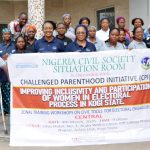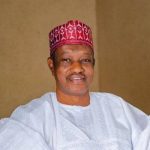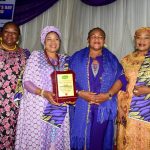A Nation in Crisis, A People in Transition: Confronting Communal Clashes, Insecurity, Youth Vulnerability, and Development Gaps in Nigeria
By Dr. Aiyeku Olufemi Samuel
Policy Consultant | Governance Analyst | Development Economist
Introduction
In the last decade, Nigeria has been gradually engulfed by a troubling wave of communal clashes, armed banditry, youth criminality, and worsening socio-economic divides. From the brutal herder-farmer conflicts to the rising spate of kidnappings, drug use among youths, out-of-school children, and maternal health emergencies, the signs are not only ominous—they are dangerous.
This isn’t just a failure of governance or policy. It is a failure of collective consciousness, weakened institutions, and long-term neglect of local development.
More than 200 people were reportedly killed in Benue State’s violent communal crisis within months in 2024 and recently above same figures in 2025. In Mokwa, Niger State, hundreds were displaced and several lives lost to devastating floods in 2024 and again recently a worsening scene in 2025. These events are not isolated incidents — they are symptoms of a deeper national fracture.
The Challenges at a Glance
• Communal and Ethno-Religious Clashes
From Benue to Plateau, Zamfara to Southern Kaduna, Niger State to Kogi State, Eastern and Southern States, the cycle of reprisal killings, cattle rustling, and land-based violence continues unabated. What fuels this?
– Historical grievances, weak justice systems, political manipulation, and environmental pressures.
• Kidnappings and Banditry
Nigeria recorded over 3,600 kidnapping incidents in 2023 alone (ACLED Data), mostly in the Northwest and Northcentral. Victims include students, women, and even clergymen.
This has become a criminal industry, fuelled by poverty, corruption, arms trafficking, and a porous security architecture.
• Herders and Farmers Clashes
The National Livestock Transformation Plan (NLTP) has yet to yield the needed stability.
Climate change, dwindling grazing routes, and population growth continue to pit herders and sedentary farmers against each other — often with deadly consequences.
• Youths in Crime, Cultism, and Drugs
The NDLEA seized over 7,500 tons of illicit drugs in 2023, while thousands of Nigerian youths are either addicted or incarcerated due to drug-related crimes.
Idle hands, lack of opportunity, toxic peer pressure, and digital exposure have become potent forces dragging our future into early destruction.
• Out-of-School Children
According to UNICEF (2024), over 10.5 million Nigerian children are currently out of school — the highest in the world.
This is an educational emergency, and a ticking time bomb for the next generation of radicalization and economic exclusion.
• Maternal and Child Health
Nigeria remains one of the most dangerous places to give birth, with a maternal mortality ratio of 512 per 100,000 live births (World Bank, 2023).
Weak primary health care systems, poor health financing, traditional beliefs, and gender inequality remain major culprits.
Strategic Analysis: The Interlinked Web
Each of these crises—security, education, health, and youth instability—doesn’t stand alone. They are interwoven, like strands of a collapsing rope:
* Insecurity displaces families and destroys livelihoods.
* Displacement leads to school dropouts, food insecurity, and community breakdown.
* Idle, traumatized youth become easy targets for criminals, terrorists, and drug dealers.
* Poor maternal health outcomes worsen when communities are unstable and inaccessible.
So, how do we move from reaction to reconstruction, from lamentation to transformation?
The Way Forward: Solutions and Recommendations
For Government at All Levels:
• Strengthen Local Security Networks
Establish, regulate, and support state/community policing backed by strong judicial systems.
• Implement Land Use and Grazing Reforms
Scale up NLTP and ensure conflict-sensitive land management practices.
• Youth Employment Schemes
Expand tech-enabled vocational training, support youth-owned enterprises, and discourage political thuggery.
• Invest in Early Warning Systems
Establish grassroots intelligence units and mediation structures to detect and de-escalate potential communal tensions.
• Improve Education Access and Quality
Reintroduce mobile schools for rural areas, incentivize girls’ education, and increase teacher recruitment and welfare.
• Revamp Maternal Health Systems
Strengthen PHCs with skilled birth attendants, solar energy, drugs, and safe transport systems.
For Religious Leaders and Faith Institutions:
• Promote Tolerance and Social Harmony
Use platforms to preach peace, co-existence, and reject political incitement.
• Launch Community Healing Programs
Address trauma, promote forgiveness, and offer psychosocial support through churches/mosques.
• Drive Behavior Change in Health and Education
Mobilize congregants for vaccinations, safe delivery practices, and school re-enrollment.
For Traditional Rulers and Royal Fathers:
• Serve as Conflict Mediators
Actively engage in non-violent dispute resolution before escalation.
• Support Agricultural Collaboration Models
Promote local herder-farmer cooperative systems.
• Advocate for Local Development
Leverage cultural influence to attract infrastructure and federal/state investment.
For Schools, Teachers, and Civil Society:
• Embed Civic and Peace Education
Train children and youth on dialogue, tolerance, and leadership from early stages.
• Organize Anti-Drug and Anti-Crime Campaigns
Work with NDLEA and NGOs to engage students, communities, and parents.
• Partner with Media for Advocacy
Drive mass sensitization on education, health, and peaceful coexistence.
The Role of Citizens
Change begins with each of us. Every parent, every youth, every market woman or artisan must see themselves as a stakeholder in peace and progress.
* Report suspicious movements.
* Embrace dialogue over violence.
* Keep your children in school.
* Say no to cultism and criminal enterprise.
* Protect women during childbirth and after.
* Be your neighbor’s keeper.
“The peace we seek in Abuja starts in our compounds in Gboko, Otukpo, Mokwa, Jos, and Onitsha.”
~ Dr. Aiyeku Olufemi
Conclusion: Our Pain Must Birth Purpose
As we mourn the deaths in Benue and console the displaced in Mokwa and beyond, we must resolve that this must not be our normal.
Nigeria cannot afford to keep losing its future to avoidable violence, poor governance, and social neglect.
This is a national wake-up call.
Let us rise — as leaders, citizens, parents, clergy, traditional authorities, teachers — and build a nation that protects its people, uplifts its youth, heals its women, and educates its children.
Because when a nation rises together, no force of destruction can hold it back.
Written by:
Dr. Aiyeku Olufemi Samuel
Policy Consultant | Governance Analyst | Development Economist
Co-founder & Lead Consultant,
Global Human Capital & Energy Management Limited.












